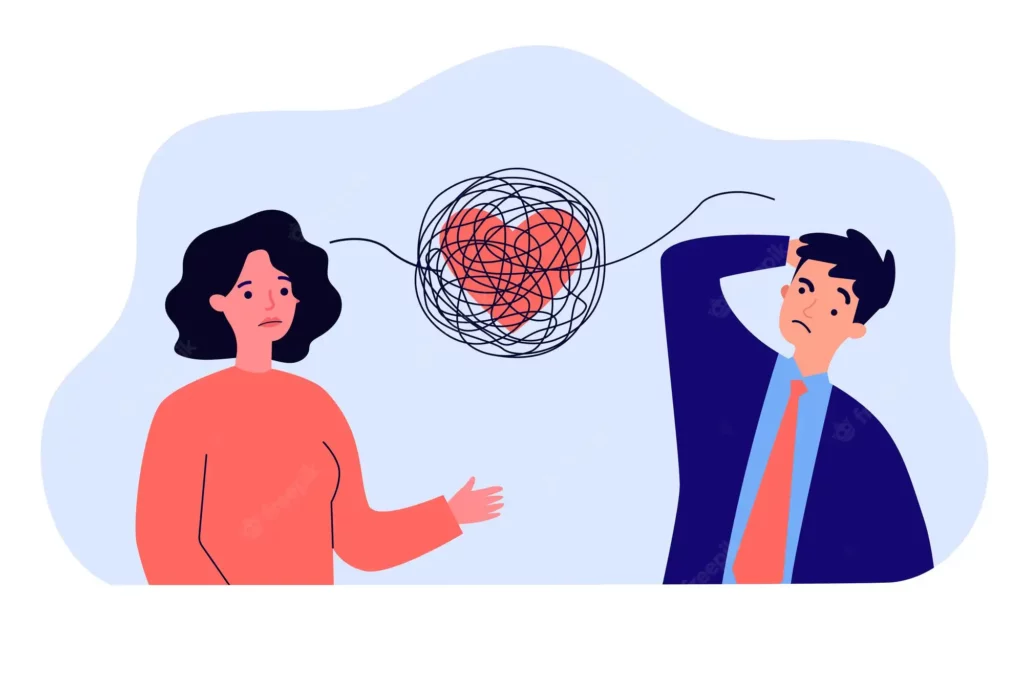In many relationships, the presence of ADHD can be likened to an invisible third party; often silent, sometimes disruptive, but always present. ADHD doesn’t just influence the individual diagnosed—it weaves itself into the very fabric of relationships, especially marriages. It can bring unique challenges, but it’s essential to remember that it can also introduce a range of strengths. This blog post aims to shed light on the complexities of ADHD within marriage and offers guidance through expert counseling advice for couples eager to embrace both their challenges and strengths.
Contents
How ADHD Has Affected My Marriage?
 When someone is grappling with ADHD in a marriage, it often becomes a silent actor influencing daily interactions, emotional connections, and logistical responsibilities within the relationship. Here’s an exploration of how ADHD can affect marriage.
When someone is grappling with ADHD in a marriage, it often becomes a silent actor influencing daily interactions, emotional connections, and logistical responsibilities within the relationship. Here’s an exploration of how ADHD can affect marriage.
1. Misunderstandings and Miscommunications
ADHD can sometimes create communication barriers due to differences in processing and expressing information. A partner with ADHD might forget important details or find it difficult to follow conversations. Eventually, this leads to misunderstandings and frustrations on both sides.
2. Inconsistency and Unpredictability
The inconsistency that often accompanies ADHD—like forgetfulness or impulsivity—can lead to a perceived lack of reliability. This unpredictability can place additional pressure on the non-ADHD partner to maintain order and routine.
3. Emotional Volatility
Emotional dysregulation is a common feature of ADHD. This may manifest as intense emotions, mood swings, or a quick temper, leading to heightened conflicts and emotional hurt in the relationship.
4. Impact on Intimacy
The impulsivity, distractibility, and emotional fluctuations associated with ADHD can also affect intimacy, both emotionally and physically. This can create a disconnect between partners, affecting the depth and strength of the marital bond.
5. Unequal Division of Responsibilities
ADHD can make it challenging to manage tasks and responsibilities. It often leads to an unequal division of labor within the relationship. This imbalance can lead to resentment and stress.
6. Financial Strain
Impulsivity and difficulty with organization, often associated with ADHD, can lead to financial strain. Unplanned spending, forgetting to pay bills, and struggles with employment can become significant sources of tension within the marriage.
ADHD can indeed pose challenges in a marriage, making it crucial for both partners to work together to navigate its complexities.
How Does ADHD Marriage Counseling Work?
 ADHD marriage counseling is a specialized approach to couples therapy that acknowledges the unique challenges and dynamics presented by ADHD within a relationship. The counseling process is designed not only to address the common issues faced by many couples but also to directly tackle the specific impacts of ADHD.
ADHD marriage counseling is a specialized approach to couples therapy that acknowledges the unique challenges and dynamics presented by ADHD within a relationship. The counseling process is designed not only to address the common issues faced by many couples but also to directly tackle the specific impacts of ADHD.
Here’s a breakdown of how ADHD marriage counseling typically works:
Assessment and Education
- Initial Assessment: The therapist starts by understanding the dynamics of the relationship, the role of ADHD in it, and the specific challenges both partners face.
- Education: Knowledge is power. Many couples benefit from simply understanding how ADHD manifests in adults, its impact on relationships, and the physiological and neurological underpinnings.
Communication Skills Training
- Active Listening: Given the communication barriers often present, partners are taught to listen actively and without judgment.
- Effective Expression: This helps the ADHD partner communicate their experiences and challenges while teaching the non-ADHD partner to convey feelings without assigning blame.
Strategies for Managing ADHD Symptoms
- Task Management: Implementing tools and strategies, such as calendars, alarms, and lists, to help manage daily responsibilities.
- Emotional Regulation Techniques: This might include mindfulness exercises, breathing techniques, and cognitive-behavioral strategies to help manage impulsivity and emotional outbursts.
Enhancing Relationship Intimacy
- Reconnection Exercises: Activities and exercises designed to help partners reconnect emotionally and physically.
- Understanding and Appreciation: Encouraging both partners to appreciate each other’s strengths and unique qualities.
Addressing Imbalances
- Division of Responsibilities: Working together to find a balance in household chores, parenting duties, and financial responsibilities.
- Setting Boundaries: Helping partners establish personal boundaries, ensuring both get the individual time and space they need.
Medication and External Support
- While marriage counseling itself doesn’t prescribe medication, therapists may suggest seeing a psychiatrist or primary care provider for a medication evaluation if they believe it can benefit one or both partners.
- Support Groups: Therapists may recommend ADHD support groups or couples’ workshops, which can provide additional resources and community support.
ADHD marriage counseling is a collaborative effort between the therapist and the couple. It’s essential for both partners to be engaged, open, and willing to make changes.
What Techniques Are Used In ADHD Marriage Counseling?
 ADHD marriage counseling employs a variety of techniques tailored to address the unique challenges posed by ADHD in marital relationships. Here are some of the core techniques commonly used:
ADHD marriage counseling employs a variety of techniques tailored to address the unique challenges posed by ADHD in marital relationships. Here are some of the core techniques commonly used:
Cognitive Behavioral Therapy (CBT)
CBT aims to address behaviors exacerbated by ADHD symptoms. For instance, one partner’s forgetfulness might lead the other to harbor feelings of being undervalued. Through behavioral interventions, couples can recognize these triggers and develop strategies to handle them more constructively. Cognitive reframing, on the other hand, assists couples in shifting negative thought patterns. Instead of seeing forgetfulness as a sign of disregard, a partner can come to understand it as a manifestation of ADHD that isn’t personal.
Communication Training
Communication can become a significant hurdle when ADHD is in the mix. Active listening encourages partners to give each other undivided attention, ensuring that both parties feel heard and understood. Teaching the use of “I” statements helps partners convey feelings without placing blame. This method transforms confrontational statements into expressions of personal feelings, promoting a more understanding response from the other partner.
Behavioral Contracts
Clear expectations are crucial in any relationship but become even more vital when ADHD-related unpredictability is involved. Behavioral contracts are written agreements that outline specific tasks, responsibilities, or behaviors. These contracts provide a clear framework and reduce misunderstandings or forgotten responsibilities.
Mindfulness and Meditation
For someone with ADHD, the mind can be a whirlwind of thoughts, making focus and emotional regulation challenging. Mindfulness and meditation practices introduce techniques to calm the mind, enhance emotional regulation, and foster presence. By being fully “present,” couples can better connect, communicate, and understand each other.
Skills Training
While some challenges in an ADHD marriage stem from emotional or communicative differences, others arise from daily logistical struggles. Skills training directly addresses these by teaching techniques for better time management, organization, and prioritization. These skills can significantly reduce daily friction points, such as missed appointments or forgotten tasks.
Emotionally Focused Therapy (EFT)
EFT dives deep into the emotional undercurrents of a relationship. It helps couples identify recurring emotional patterns, many of which can be traced back to ADHD symptoms. By understanding and addressing these patterns, EFT aims to foster secure emotional bonds between partners, making the relationship more resilient to ADHD-induced strains.
Role-playing
Role-playing serves as a safe space for couples to simulate real-life scenarios. By acting out situations, couples can practice communication techniques, explore emotional reactions, and receive feedback in a controlled environment. This proactive approach prepares couples for real-life challenges.
Positive Reinforcement
Relationships thrive on appreciation. Positive reinforcement involves recognizing and rewarding efforts and progress in the relationship. This technique encourages a focus on the positive, promoting a more optimistic relationship dynamic.
Boundary Setting
Even the closest couples need personal boundaries. For ADHD relationships, where one partner might struggle with impulsivity or the other with a need for personal space, setting clear boundaries becomes vital. Boundary setting ensures that while intimacy is nurtured, individual needs and personal spaces are respected.
In sum, ADHD marriage counseling employs a multifaceted approach, integrating diverse techniques to equip couples with the skills and understanding they need to thrive together. Each relationship is unique. So counselors tailor these techniques to best fit a couple’s individual dynamics and challenges.
Conclusion
In the intricate dance of marriage, ADHD introduces steps that can either trip couples up or lead to a unique rhythm of understanding. From cognitive interventions to communication enhancements, ADHD marriage counseling offers a tailored toolkit for couples to navigate these special dynamics.
By embracing these techniques, couples can not only address the challenges posed by ADHD but also unearth its hidden strengths, transforming potential stumbling blocks into pillars of a resilient, loving, and harmonious relationship. If you are experiencing ADHD-related problems, Online ADHD Counseling in India at TherapyMantra can help: Book a trial Online therapy session


